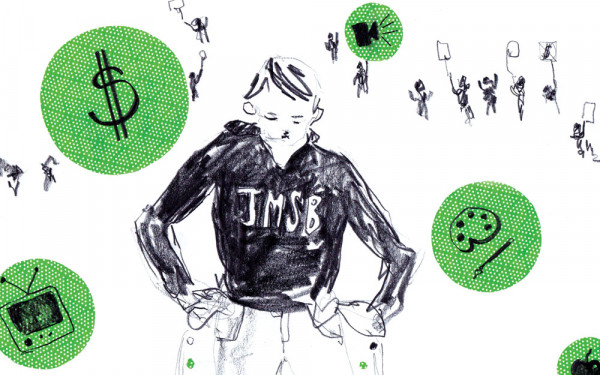Stop the Hike
Concordia University is looking to discreetly raise tuition for international students without consultation.
This tuition hike will cause irreversible damage to the diversity of Concordia’s student body and will make it even harder for disadvantaged students to graduate from the school.
This isn’t unprecedented. Back in 2008, Concordia attempted a similar measure when they raised international tuition fees after the government deregulated the tuition costs of six programs—business, engineering, computer science, pure sciences, mathematics, and law.
For the international students who already reached their home government’s annual funding limit, the tuition hike forced them to drop out of Concordia or take on significant debt. The school did not consult students about the tuition hikes, and many suffered as a result.
The same thing is happening this year. Our school administration isn’t telling us about its latest hike. The fact that it is being done in secret, without the consultation of those affected, is the provision’s major problem.
Some may argue that Concordia University has every right to increase international students’ tuition costs. But it’s very easy to criticize students from the pedestal of privilege that comes with Canadian citizenship. When international students from third world countries come to Concordia, they come at a serious disadvantage. Along with cultural and educational unfamiliarity, international students already pay tuition that is significantly higher than Canadians’. And Concordia’s administration thinks it’s okay to raise their tuition even more? That’s unacceptable.
In its public statements and marketing strategy, Concordia says it wants a diverse body and students from all different backgrounds in life. But this tuition hike will make sure that only rich people can get in.
Concordia has to be honest with us: all they care about is new revenue. They don’t care if the student body ends up being filled with only the elite. When it comes to new ways of making money, Concordia couldn’t care less about the diversity of its student body.
The school doesn’t want to tell us the exact details of its plan, because it knows we would be able to stop it. My interpretation of the strategy is that it is to secretly raise tuition, making it public knowledge near the end of the semester. This means that, as most international students head back home, they will be hit with an unexpectedly high tuition cost. For the international students who can’t afford the new hike, they simply won’t come back to Canada.
Problem solved, every victim of the tuition hike is thousands of miles away from the school, unable to protest. The victims are silenced before they can even utter a single cry.
We need to protest these tuition hikes. Protecting our right to affordable education is a core value of Quebec. For the past 50 years, the Quebec student population has fought for accessible education. Every decade since the 1960’s has been marked by a major student protest that profoundly affected our schools for the better. Students have forced the provincial government to create a new university, have fought for and won improved bursaries, and have beaten back major tuition hikes.
Every time our government tries to commercialize our institutions, we remind it that affordable education is a right. Critics may look down on our efforts to protests for affordable education, but all students in Quebec benefit from half a century of student solidarity.
After so many years, and so many successes, why would we give up our protests and let the government turn tuition into a new revenue stream? We have nothing to lose from these protests, but the shackles of crippling student debt— debt that every North American student struggles with but us.
When international students come to us for accessible education, we need to help them get it. The school doesn’t want to tell us about the hike because they know that if we mobilize, they’ll be unable to pass the measure.
We have fought off tuition hikes for a good five decades now, and we need to keep going. If this tuition hike passes, we are demonstrating that the student body isn’t as passionate about accessible education as it used to be.
It’s also important to remember that when tuition costs rise for international students, tuition hikes for all students are inevitably coming. This fight, just like every fight we’ve ever had, is a symbol of our passion for accessible education. The affordable university we have today is thanks to 50 years of protests and passion—it’s now our turn to uphold that legacy.
On Nov. 24, 2016, the Finance Committee of the Board of Governors is going to pass a vote for or against the tuition hikes. In protest, we are going to have a “Red Day.” On the day of the vote, we invite you all to wear red and to get a pin from one of our tables in the school lobbies.
Talk to and educate the people around you. Organize your friends. Speak in your classes. We are all going to be deeply affected by this, and we all have the power to stop it.


_600_832_s.png)




2_600_375_90_s_c1.jpg)